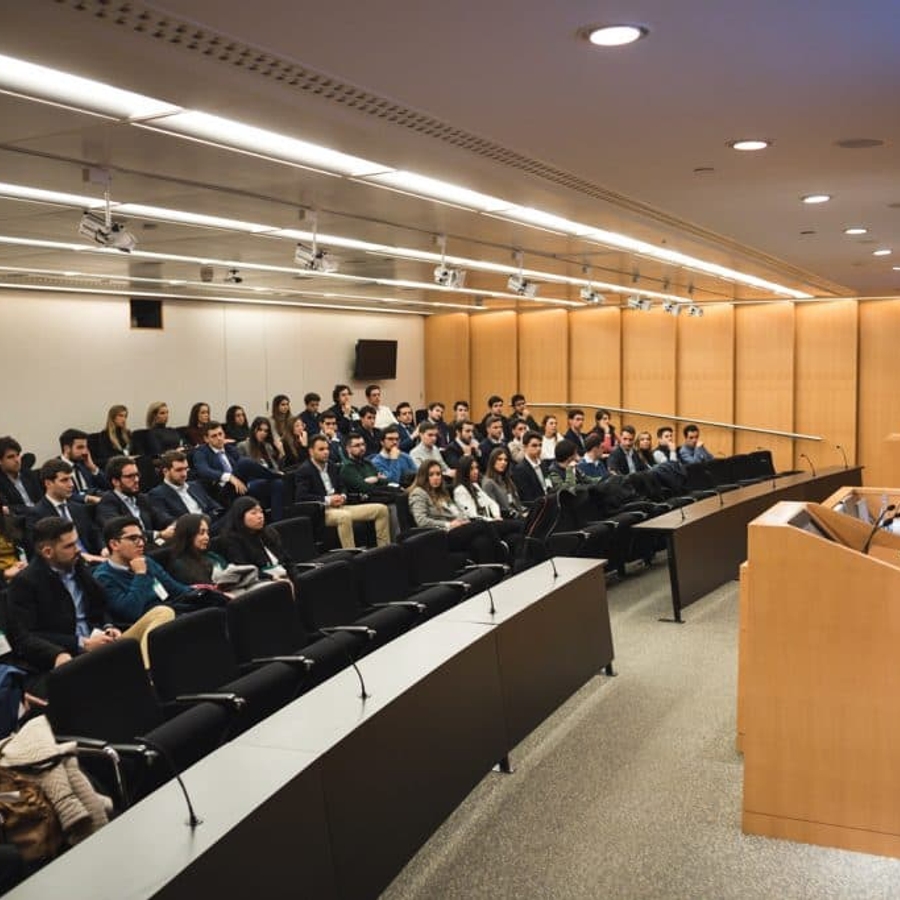
- Home
- International experience
- International mobility and exchange programs
International mobility and exchange programs

CUNEF has a strong international focus. Time spent abroad is a vital feature of our students’ CVs, and plays a fundamental role in university study. With the aim of providing our students with the professional and personal training allowing them to work in an increasingly global world, we have agreements in place with over 70 renowned international universities. All of this takes place through the Erasmus + programme (we have partnerships with 46 university establishments) and Bilateral Agreements (32 of which have been signed).
The CUNEF educational model helps bring you into closer contact with other cultures, enriching the international experience of the Centre’s students, lecturers, researchers and staff. Students can spend a semester or a whole academic year abroad.
The International Relations Department supports and underpins CUNEF’s international strategy.
CUNEF is specialize in the field of Business Management and Administration, Finance and Law. Its outstanding academic staff, its leading programs in their respective fields, its practical experience placements at companies and the rest of the extracurricular activities organised by all the CUNEF departments will make your time with us a highly productive and enriching experience.
General information for incoming exchange students:
How do I apply for an exchange stay at CUNEF? To study at CUNEF, incoming students will normally need to be nominated and presented by our partner universities. Once they have been presented, CUNEF will send the students an application to complete and finalise their registration. Incoming students will enrol for the subjects established in advance in their learning agreement at CUNEF.
The deadlines for incoming student nomination will be as follows:
• 30 May for the first term or full academic year (Fall/Autumn Semester).
• 30 November for the second term (Spring Semester).
Once at CUNEF, incoming students will enrol for the subjects established in advance in their learning agreement. Given the limited places available, definitive student enrolment for the subjects will depend on the availability of groups and subjects.
Classes
The CUNEF teaching method is based on a combination of educational methodologies delivered by an outstanding team of lecturers with a practical focus centred on the professional world. This gives students an in-depth understanding of the educational content through reflection and debate in class.
Practical Sessions
CUNEF emphasises a practical focus applied to the reality of each of the topics, dealing with real examples or simulations that allow our students to analyse the key variables influencing the study of the case, their development and consequences.
Assessment
The degree courses taught at CUNEF form part of the European Higher Education Area, and students are therefore graded in all subjects by means of a continuous assessment process. In general, the continuous assessment model follows the criteria below:
- Participation and classwork (interim examinations, case studies, exercises, projects, presentations, etc.): 40%.
- Final examination: 60%.
Continuous assessment applies to all students, including incoming students, for both the ordinary and extraordinary appraisal sessions. Students presented for the extraordinary appraisal session who failed their continuous assessment under ordinary appraisal will be assigned their extraordinary continuous assessment as their final grade for the ordinary appraisal session.
This grade is the result of applying the percentages established in the teaching guide to the final examination and the continuous assessment for the session in question. The assessment model for each subject may differ from the terms set out in this general information. It is very important that you check in the Teaching Guide before you begin studying the subject.
The results obtained in each of the subjects are graded on a numerical scale from 0 to 10, to one decimal place, with the corresponding qualitative classification. Given the application of continuous assessment, a classification of Not Presented (‘NP’) is not possible:
- 0-4,9: Fail (“Suspenso”, or “SS”)
- 5,0-6,9: Pass (“Aprobado”, or AP)
- 7,0-8,9: Merit (“Notable”, or “NT”)
- 9,0-10: Distinction (“Sobresaliente”, or “SB”)
With the aim of offering its students a global educational environment, CUNEF promotes and structures a number of programmes allowing students to spend a semester or a full academic year abroad.
The International Mobility programme essentially pursues the following aims:
- Improve skills in the language of the destination country, as well as rounded student education.
- Promote the ability to adapt and to learn in a new environment.
If you are a CUNEF student with a good academic record and wish to broaden your horizons by spending some of your study time at a foreign university, you will have the chance to take part in one of the international mobility programmes. CUNEF has signed agreements with over 70 universities worldwide, essentially through two programme formats:
The EU’s Erasmus + Mobility Program has the fundamental aim of offering students mobility across the main European countries with a view to cross-university academic cooperation in the official recognition of different courses of study at European universities.
Through the Erasmus + cooperation programs, CUNEF provides students with the chance to spend a term or a full academic year at one of the many European universities with which it has signed a cooperation agreement.
Students wishing to take part in the program and who meet the stated requirements for the scheme will need to complete the electronic form which the UCM will provide to CUNEF. This form will be available only for a specific period of time, which CUNEF will announce sufficiently in advance.
This form will be available only for a specific period of time, which CUNEF will announce sufficiently in advance.
CUNEF offers its students another mobility exchange scheme through its program of Bilateral Agreements, with the aim of promoting internationalisation, guaranteeing educational quality and ensuring an academic and personal experience that will help improve our students’ CVs and competitiveness.
At some universities, students will be required to pay any existing difference between the CUNEF fees and the fees payable in the destination university, for which CUNEF will offer the possibility of applying for a mobility bursary.
2019 – 2020 yearly announcement
Application for place
- Requirements to apply for an international mobility program place
- Have passed the complete first academic year when applying.
- Have no more than two subjects pending at the time of application (failed, not presented or not enrolled).
- Payments of all CUNEF and UCM fees must be up-to-date.
- Language requirements to apply for an international mobility program place
- Bilateral Agreements: at least level B2 or equivalent in English
- Erasmus +: level B1 or equivalent in English.
Pre-allocation of places
- Submission of applications to participate in the program: the online application should be fully completed and submitted with the required documentation via the Service Portal during the specified application period for the yearly programme. Students applying for a Bilateral Agreements place will need to fulfil the academic requirements imposed by the destination university, in terms both of past grades and language level in order to be eligible for the place. These requirements are available via the Service Portal.
- Student selection and ranking criteria: the ranking of selected students is drawn up during the month of December 2018. The ranking process will take into account criteria such as the academic year, involvement in the Buddies programme, etc.
- Publication of provisional places: once the Ranking has been drawn up, the provisional pre-allocation of places will be published. Students must specifically accept the behavioural standards and procedures of the International Programme in order to be pre-allocated a place.
Through the Erasmus + program and the UCM, our lecturers and professionals at the centre have the chance to receive bursaries to spend brief periods teaching at those higher education institutions with which CUNEF has signed an Erasmus mobility agreement for its lecturers and professional staff.
This type of international experience offers academics a series of benefits such as skills enhancement, the opportunity for professional development and the chance to see the practices, policies and educational system of the destination country first hand. It can serve to open doors to new partnerships among institutions, to generate a greater understanding of social and cultural diversity, better promotion of international mobility schemes and acts as a motivational incentive at work, alongside other aspects.
As for funding, the program is financed by the European Union through the SEPIE (the Spanish Education Internationalisation Service). Waiting for 20/21 scheme.
Employee and lecturer mobility for training purposes: Erasmus+ Program
Through the Erasmus + and the UCM our employees and lecturers are able to receive bursaries for short-term training courses at:
- Higher Education Institutions that hold the European Erasmus Charter (ask at the International Relations office).
- Any public or private organisation belonging to the labour market or the areas of education, training and youth affairs.
The program is funded by the European Union through the SEPIE (the Spanish Education Internationalisation Service). Consult the conditions for the 2019/20 scheme.

